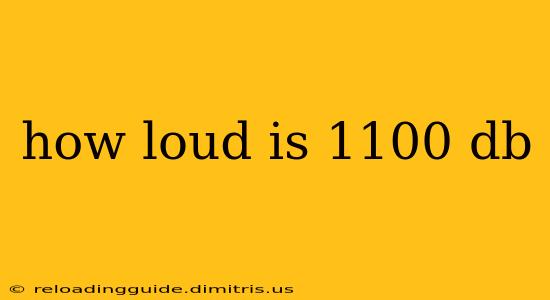How Loud is 1100 dB? Understanding the Decibel Scale and Its Limits
The question "How loud is 1100 dB?" is a fascinating one that delves into the very limits of the decibel scale and the physics of sound. The simple answer is: 1100 dB is incomprehensible in the context of everyday sound. It's far beyond anything we could experience or even imagine. To understand why, we need to delve into the decibel scale itself.
Understanding the Decibel Scale (dB)
The decibel scale is logarithmic, not linear. This means that a 10 dB increase represents a tenfold increase in sound intensity. A 20 dB increase represents a 100-fold increase, and so on. This exponential nature is why seemingly small increases in decibels can result in dramatically louder sounds.
Here's a quick comparison to put things into perspective:
- 0 dB: The threshold of human hearing. This is the quietest sound a person with normal hearing can detect.
- 30 dB: A whisper.
- 60 dB: Normal conversation.
- 90 dB: A power lawnmower or a motorcycle. Prolonged exposure can cause hearing damage.
- 120 dB: A rock concert or a firecracker. Immediate and significant hearing damage is possible.
- 140 dB: A jet engine at takeoff. Pain and immediate hearing damage are almost certain.
The Limits of the Decibel Scale and the Concept of 1100 dB
As you can see, the decibel scale quickly reaches levels that are extremely harmful and painful to human ears. 1100 dB is so far beyond these levels that it enters the realm of theoretical physics. At such intensities, the sound itself would become incredibly destructive.
Why 1100 dB is impossible (in a practical sense):
-
Energy requirements: Generating 1100 dB would require an unimaginable amount of energy, likely more energy than exists in the entire observable universe. The sound would need to be created with a mechanism capable of outputting immense destructive power.
-
Physical limits of sound: At extreme intensities, the very nature of sound waves changes. The air molecules would not just vibrate; they would be violently displaced, creating a shockwave of unimaginable magnitude, resulting in phenomena like extreme plasma formations rather than sound.
-
The event horizon: The sheer energy of 1100 dB would likely create a localized event horizon, resulting in a black hole. This is pure theoretical speculation, but it underscores the absurdity of trying to comprehend a sound of this magnitude.
In short, 1100 dB is not just "loud"; it's a concept that transcends the normal understanding of sound and enters the domain of theoretical astrophysics and cosmology. It's a number that, while mathematically possible, has no realistic physical counterpart in our universe.

